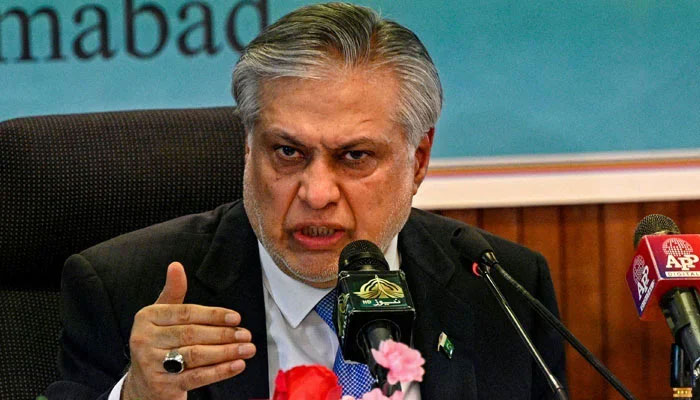Dar hopes FBR will surpass Rs9.4tr tax target
The finance minister says board’s new chief picked from within revenue cadre
ISLAMABAD: Instead of appointing outsiders, the government has chosen to select a new Chairman for the Federal Board of Revenue (FBR) from within the tax machinery, according to Finance Minister Ishaq Dar.
He expressed hope that the FBR would not only achieve the target of Rs9.4 trillion but also surpass it, aiming to reach a historic milestone of Rs10 trillion in revenue collection during the current fiscal year. Finance Minister Ishaq Dar made these remarks during a ceremony held at the FBR headquarters on Wednesday to announce the appointment of the new Chairman, Amjad Zubair Tiwana.
Ishaq Dar emphasised the importance of effective enforcement, plugging leakages, and expanding the tax base to achieve this ambitious revenue target. He also addressed the challenges posed by twin deficits, namely the budget deficit and the current account deficit, which have been major concerns for Pakistan’s economy. He noted that the current account deficit was the more significant challenge of the two, and the government took stringent measures to convert it into a surplus after February 2023 to avoid default.
In the past, there were concerns about Pakistan’s ability to make payments, as it had to pay $3.7 billion in May and June 2023 with foreign exchange reserves standing at around $3 billion. However, Ishaq Dar clarified that Pakistan managed to repay the obligations of the last two months and avoided default. He mentioned that the risk of default was now over as the total foreign exchange reserves were around $13 to $14 billion and expected to rise further.
The curtailment of the current account deficit had a negative impact on the FBR, but it was a necessary step taken in the larger interest of the country. To manage the foreign exchange position, imports were restricted during this period. Ishaq Dar also acknowledged the delay in finalising the last IMF programme after February 2023, which led the government to adopt stringent controls to fulfil sovereign commitments and make repayments well within the stipulated timeframe. This resulted in converting the current account deficit from deficit to surplus for four consecutive months, from March to June 2023.
He praised the resilience of the nation in facing difficult times, as Pakistan survived despite challenging circumstances. The government approved the establishment of a Sovereign Wealth Fund, encompassing seven state-owned enterprises with a value of $8 billion, which would be offered to potential investors from the Gulf region and other states. Similar Sovereign Wealth Funds had been created in Indonesia and Egypt to attract investments.
Pakistan possesses substantial assets worth $6 trillion, but the country was experiencing a liquidity crunch that could be overcome with proper measures. In an effort to attract potential investors in various sectors such as mining, agriculture, and IT, the government established the Special Investment Facilitation Council (SIFC). Ishaq Dar also acknowledged the decline in the FBR’s tax-to-GDP ratio, which dropped to 9.6 percent in the last fiscal year from over 12 percent in 2016-17. He stressed the need to raise this ratio from single digits to double digits, expressing confidence that it could be achieved. Finally, he mentioned the importance of improving the perception of the FBR and noted that it was once regarded as the “Friendly Board of Revenue” by the business community back in 2016-17.
-
 AI Film School Trains Hollywood’s Next Generation Of Filmmakers
AI Film School Trains Hollywood’s Next Generation Of Filmmakers -
 Royal Expert Claims Meghan Markle Is 'running Out Of Friends'
Royal Expert Claims Meghan Markle Is 'running Out Of Friends' -
 Bruno Mars' Valentine's Day Surprise Labelled 'classy Promo Move'
Bruno Mars' Valentine's Day Surprise Labelled 'classy Promo Move' -
 Ed Sheeran Shares His Trick Of Turning Bad Memories Into Happy Ones
Ed Sheeran Shares His Trick Of Turning Bad Memories Into Happy Ones -
 Teyana Taylor Reflects On Her Friendship With Julia Roberts
Teyana Taylor Reflects On Her Friendship With Julia Roberts -
 Bright Green Comet C/2024 E1 Nears Closest Approach Before Leaving Solar System
Bright Green Comet C/2024 E1 Nears Closest Approach Before Leaving Solar System -
 Meghan Markle Warns Prince Harry As Royal Family Lands In 'biggest Crises' Since Death Of Princess Diana
Meghan Markle Warns Prince Harry As Royal Family Lands In 'biggest Crises' Since Death Of Princess Diana -
 Elon Musk Weighs Parenthood Against AI Boom, Sparking Public Debate
Elon Musk Weighs Parenthood Against AI Boom, Sparking Public Debate -
 'Elderly' Nanny Arrested By ICE Outside Employer's Home, Freed After Judge's Order
'Elderly' Nanny Arrested By ICE Outside Employer's Home, Freed After Judge's Order -
 Keke Palmer On Managing Growing Career With 2-year-old Son: 'It's A Lot'
Keke Palmer On Managing Growing Career With 2-year-old Son: 'It's A Lot' -
 Key Details From Germany's Multimillion-euro Heist Revealed
Key Details From Germany's Multimillion-euro Heist Revealed -
 David E. Kelley Breaks Vow To Cast Wife Michelle Pfeiffer In 'Margo's Got Money Troubles'
David E. Kelley Breaks Vow To Cast Wife Michelle Pfeiffer In 'Margo's Got Money Troubles' -
 AI-powered Police Robots To Fight Crime By 2028: Report
AI-powered Police Robots To Fight Crime By 2028: Report -
 Everything We Know About Jessie J's Breast Cancer Journey
Everything We Know About Jessie J's Breast Cancer Journey -
 Winter Olympics 2026: What To Watch In Men’s Hockey Today
Winter Olympics 2026: What To Watch In Men’s Hockey Today -
 Winnie Harlow Breaks Vitiligo Stereotypes: 'I'm Not A Sufferer'
Winnie Harlow Breaks Vitiligo Stereotypes: 'I'm Not A Sufferer'




